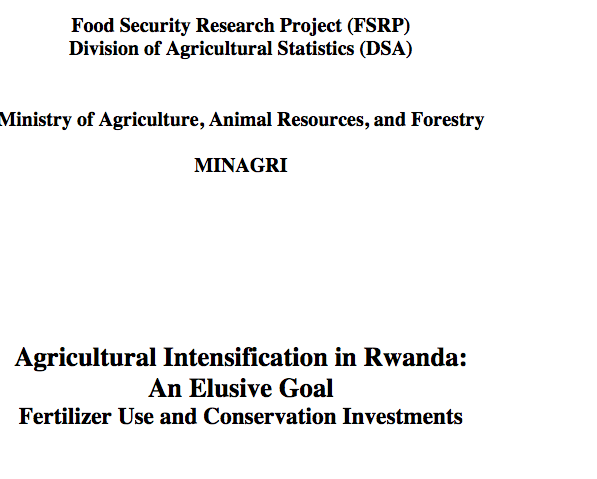The LAND Project is a five year program supported by the United States Agency for International Development (USAID). Its primary goal is strengthening the resilience of Rwandan citizens, communities and institutions and their ability to adapt to land-related economic, environmental and social changes.
Resilience is defined as “the ability to withstand or recover from difficult conditions.” It also comprises the ability of human and ecological systems to recover from shocks or difficult changes, and to transform to a better condition by responding flexibly and creatively to stress factors. In Rwanda, land tends to be one of the primary assets citizens rely on to buffer against difficult conditions and rapid change.
The project’s central objectives are twofold:
1.Increased capacity of local Rwandan institutions to generate high quality, evidence-based research on land-related issues that can be used by the Government, civil society organizations, and Rwandan citizens.
2. Increased understanding of land laws, policies, regulations, and legal judgments on land-related issues by GOR officials, local civil society organizations, research institutes and citizens.
Key outcomes of the project include:
- Holding annual National Land Research Agenda workshops to establish the research priorities of land sector stakeholders that the LAND Project will support. These workshops bring together multiple stakeholders from government, civil society and the research community;
- Supporting research on land-related issues through competitive awards to Rwandan research institutions, universities, and civil society organizations, and providing tailored capacity building assistance to improve research and advocacy capabilities;
- Offering training and other support to legal assistance providers to enhance their capacity to support women and vulnerable populations in understanding and realizing their land rights;
- Training local land authorities on the implementation of the land law and regulations.
- Carrying out research on critical land issues, including gendered land rights in practice, community rights to resources in and around protected areas, and expropriation.
- Managing a land-focused website to improve research, communications, and policy advocacy efforts that are focused on land, and to act as a vehicle for enhancing collaboration between actors working in the land sector;
- Providing organizational development support to civil society organizations supporting women’s land rights.
- Supporting innovative and coordinated communications approaches by civil society and government that enhance the knowledge of Rwandan citizens about research findings and their land rights.
Because the LAND Project is a five year endeavor, we are seeking an institution that has the interest, capacity, skills and resources to eventually take over hosting and maintenance of the website, ensuring it stays up-to-date and relevant to the land sector stakeholder community. If your organization is potentially interested in assuming management of this site, please contact us and tell us why you believe your institution would be an ideal candidate.
Members:
Resources
Displaying 131 - 135 of 149Perspective of Land Reform in Rwanda
In Rwanda, land is one of the most important and fundamental natural resources. The land resource is the foundation of the national economy through agriculture which occupies more than 90% of Rwandan in rural area. However, problems related to land in Rwanda are varied. This paper summarizes the history of land tenure in Rwanda, the primary challenges in the land sector today, and recommends actions to further land reform.
Land and Poverty in Rwanda
Paper for a LandNet RwandaRwanda workshop. Contains a conceptual framework on land and poverty; land attributes and the seeds of poverty including tenure issues; critical challenges to policy makers. Includes a descriptive summary of land problems from a recent university survey. Argues that land policies are fragile when mechanistically determined from the top, and need to involve the people in arbitration of disputes. Concludes that there can be no answer to poverty that does not take account of land.
Agricultural Intensification in Rwanda. An elusive goal fertilizer use and conservation investments
Prior to the 1994 war, Rwanda had one of the best agricultural data bases on the African continent with a consistent time series on production, area, and yield data spanning the period from 1984 through 1992. This data base, drawn from annual surveys of a nationally representative random sample of approximately 1,240 farm households, was supplemented with a variety of specialized surveys conducted intermittently on topics such as input use, livestock production, natural resource management practices, non-farm income, etc.
Problématique du Régime foncier au Rwanda.
Contexte et perspectives, relations avec l'habitat
regroupé.
Le retour des réfugiés de 1959, la politique de regroupement de l'habitat adoptée en
1996, la disette qui frappe le pays depuis 1999, la faible pluviosité qui prévaut dans le
pays depuis deux ans après le phénomène el nino, conduisent à une prise de
conscience nouvelle de ce qu'il faut appeler la question foncière, de ses relations
avec la production agricole dans le cadre de l'option de sécurité alimentaire. Les
conditions dans lesquelles la problématique foncière s'est progressivement imposée
Kigali Après la Guerre : La Question Foncière et l'Accès au Logement
Conflits armés et crises alimentaires contribuent à leur manière à urbaniser
l’Afrique sub-saharienne lorsque les villes jouent un rôle de refuge et que les combats
se déroulent à la campagne. Malgré l’évacuation de ses habitants lors de la chute du
régime Habyarimana en 1994, la capitale du Rwanda n’a pas démenti ce schéma et
s’est vite repeuplée une fois le génocide terminé. La différence est qu’elle est
désormais tenue par des élites tutsi et que les bouleversements de l’année 1994 ont





